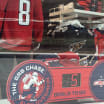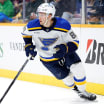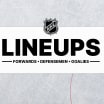Mark Howe has spent his life in hockey and considers it the best possible life to have lived.
His contributions to the game will be rewarded when he receives the Lester Patrick Trophy for outstanding service to hockey in the United States.
"I have a passion for the game, a love for the game," Howe said. "I'm 61 years old. I'm very fortunate to have been with some great organizations and to be involved in a sport, and to receive an award like this is very, very special."
Mark Howe makes name for himself
Son of Gordie Howe to join father as Lester Patrick Trophy recipient
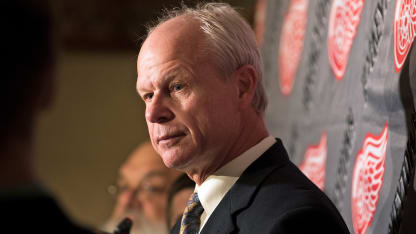
Howe and ECHL co-founder Pat Kelly will receive the Lester Patrick Trophy in Philadelphia on Wednesday, along with the 2016 inductees into the United States Hockey Hall of Fame: former NHL player Craig Janney, longtime high school hockey coach Bill Belisle and the 1996 U.S. World Cup team.
Gordie Howe, Mark's father, won the Lester Patrick in 1967, the second year it was awarded. Mark's commitment to hockey in the country started not long after, when he was a 16-year-old named to the United States team for the 1972 Sapporo Olympics. He helped the U.S. win a silver medal, and said the experience of wearing the USA jersey resonates with him more than 40 years later.
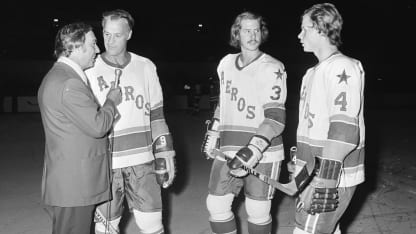
© Denis Brodeur/Getty Images
"I look back and I reflect on some things and I appreciate things more, past experiences," Howe said. "I was asked a couple times [to play for the U.S.] but I had a few bad injures, a lot of it was my back, so I turned them down a couple times. You tell the kids, especially the first couple times you get an opportunity. You take a lot of pride representing your country."
Howe had pride representing all the teams he played for. He helped the Toronto Marlboros of the Ontario Hockey Association win the 1973 Memorial Cup and won the Stafford Smythe Trophy as Memorial Cup MVP.
Then in 1973-74, at times playing on a line with his father and his brother, Marty Howe, Mark had 38 goals and 79 points with Houston of the World Hockey Association and was named the league's rookie of the year.
He spent four seasons in Houston and two with the New England Whalers before they moved to the NHL and became the Hartford Whalers in 1979-80.
Not long after the move to the NHL, Howe was moved to a new position, shifting from left wing to defense.
He adjusted fine and was on his way to becoming one of the best in the League at his position when his career nearly came to an end. During a game against the New York Islanders on Dec. 27, 1980, Howe was defending a 3-on-2 rush when he fell and slid into the goal. One of the metal spikes used at the time to anchor the goal post to the ice pierced his buttocks.
Howe was taken to the hospital, where he said doctors told him, "an inch one way and [the metal] could have gone into my spinal cord; an inch the other way it would have pierced my sphincter muscle and I would have been walking around with a colostomy bag."
He lost nearly three-and-a-half pints of blood, developed an infection that necessitated surgery to drain an abscess that had formed at the injury site, and his weight fell from 192 pounds to 176.
"To this day, I believe the best year I was having was in 1980 and it was the year I got skewered on the net," Howe said. "I was in the top 10 in scoring in the League and I was really learning the position of playing defense. That injury really set me back."
Howe returned too soon, missing 17 games, and his play was affected. Hartford traded him to the Philadelphia Flyers on Aug. 19, 1982.
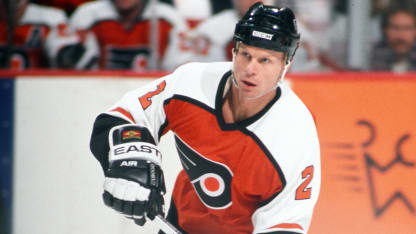
© Steve Babineau/Getty Images
"For me, even though dad had been retired, it got me out from under his shadow a little bit," Howe said. "But the other part … the biggest thing for me was when I came [to the Flyers] was the fact that the philosophy and the mold of what this team was, how the game was supposed to be played. It was all about team, nothing about individuals. That's how I was brought up. That's what I always believed in. It was an absolute perfect fit for me."
The Flyers felt the same way.
"We finally had a defenseman that was super-elite," said Flyers president Paul Holmgren, who coached the Flyers during Howe's tenure. "The Flyers have had a lot of great defensemen prior to Mark coming here, like Jimmy Watson and Tom Bladon and Joe [Watson], but we really didn't have an elite guy like Mark Howe. … He could skate, he could shoot, he competed. He was very good defensively. He wasn't very big (5-foot-11, 185 pounds) but he could play with big guys, battle with big guys. A great all-around player."
Howe was 27 when he arrived in Philadelphia, and his presence carried a significant weight.
"Mark was a quiet guy but he led by his work ethic," said Flyers teammate Brad Marsh. "Not only in the games, but in practice. When you have your best player being a leader in practice and in games that is a big plus."
Dave Poulin was entering his second full NHL season when he was named Flyers captain prior to the start of the 1984-85 season, and said Howe was the reason it worked.
"[Howe] was a quiet presence but a really strong presence behind me when I was named captain," Poulin said. "He was one of the key aspects as to why it worked. … He had no qualms about saying what had to be said. But he was much more lead by example both on and off the ice, that quiet force."
Howe's best time with the Flyers was 1984-85 to 1986-87. He had 197 points in 219 games, sixth among defensemen, and was a plus-193, second among all players to Wayne Gretzky (plus-239). His plus-85 in 1985-86 is the League's eighth-best single-season mark, and since then one other player has been at least a plus-75: Brad McCrimmon, Howe's defense partner, who was a plus-83 in 1985-86.
The Flyers went to the Stanley Cup Final in 1985 and 1987, losing to the Edmonton Oilers each time. Howe finished second in Norris Trophy voting to Paul Coffey in 1986 and to Ray Bourque in 1987, and was third in voting for the 1986 Hart Trophy, behind Gretzky and Mario Lemieux.
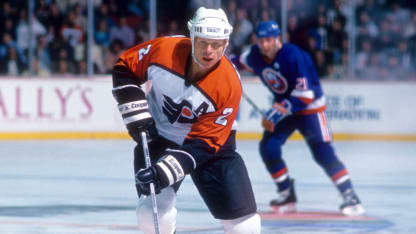
© B Bennett/Getty Images
"One of the things I was most proud of, Brad McCrimmon and I went just over two years where whenever there was a competitive drill in practice, we never lost for two years," Howe said. "That's what carried over to the games. … You competed and you wanted to win every drill every day. I still preach that because if you're having success in practice you're going to have success in the games."
Howe signed with the Detroit Red Wings in 1992, but injuries limited him to 122 games in his three final NHL seasons. He retired after playing two games in the 1995 Stanley Cup Final against the New Jersey Devils. He finished his NHL career with 742 points in 929 games. When you add his WHA totals, he had 1,246 points in 1,355 games. He was elected to the Hockey Hall of Fame in 2011.
Howe became a professional scout with the Red Wings after he retired, and since 2005 has been their director of professional scouting and a trusted adviser to Red Wings general manager Ken Holland.
"He's a great pro scout, got tons of passion, he's got a work ethic, he was a great player, and he understands team building and the types of players that we think we need to make our team better," Holland said. "He's been an incredibly important decision maker for us in pro scouting."
Howe also continues to have a significant role in advancing hockey in the U.S. He was a scout for Team USA for the World Cup of Hockey 2016 and coached a team of top U.S.-born 2017 NHL Draft prospects at the 2016 USA Hockey All-American Prospects Game in September.
He's also working on advancing the work of the Howe Foundation, which was started by his mother, Colleen Howe.
"My mom had visions of things, but they never came to fruition over her lifetime," he said. "But it's our goal between myself, my two brothers and my sister, we're going to make that thing as big as possible."
Like all the other things Howe has done in his life, he has a passion to improve the game. And because of that passion, it's likely he'll be successful.
"He loves hockey," Holland said. "He wants to see hockey grow. As an American, he wants to see hockey grow and thrive in the United States. He's proud to represent the country. … Mark is incredibly passionate about the sport, about his country, about growing the game, about the Detroit Red Wings. He's a very, very passionate person. That translates to the other things.
"Once you got passion, and Mark Howe has passion, he's got passion for the game, he's got passion for the country, he's got passion for the Detroit Red Wings. He's got passion. I see it when he sees his old teammates that he played numbers of years with. Mark has a lot of passion. They're loyal people. He's passionate the about the game, he's passionate about the growth of the game in the United States. He's passionate when he gets asked to represent his country as a player or as part of management team. You know he's going to be all in."








